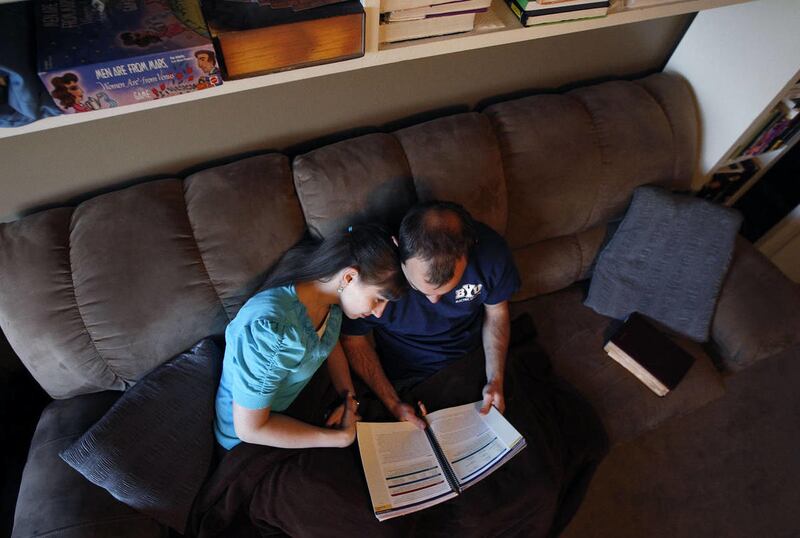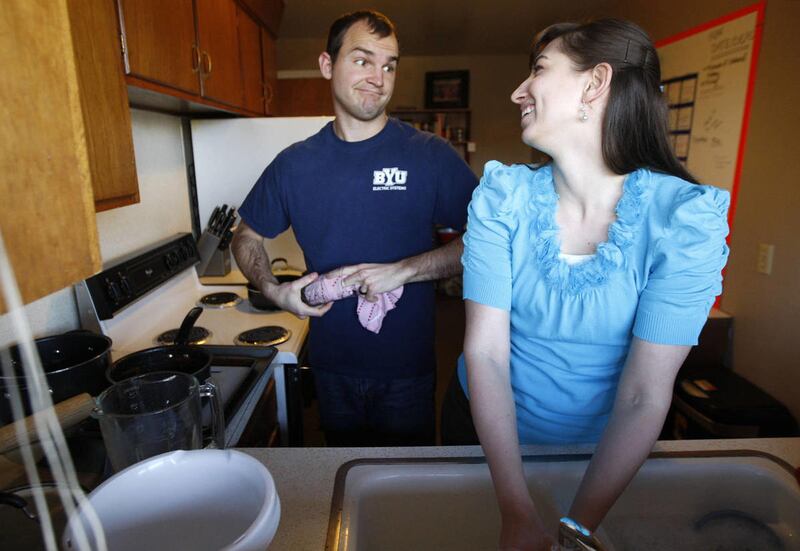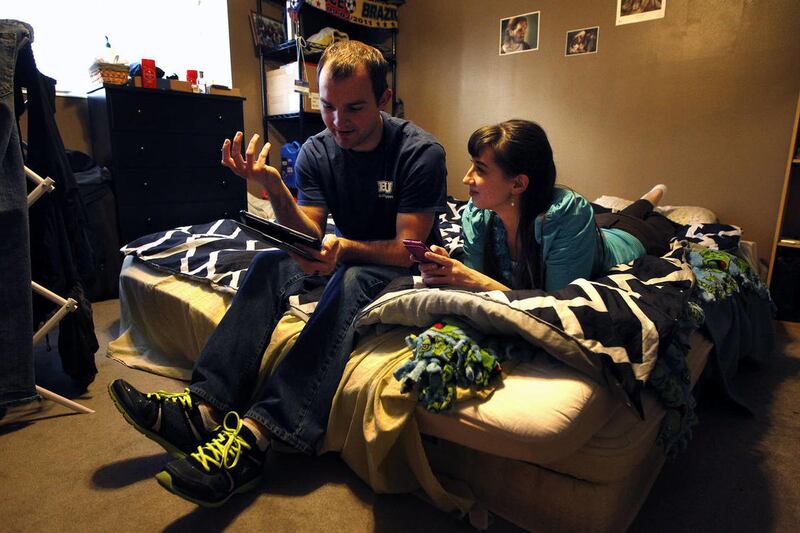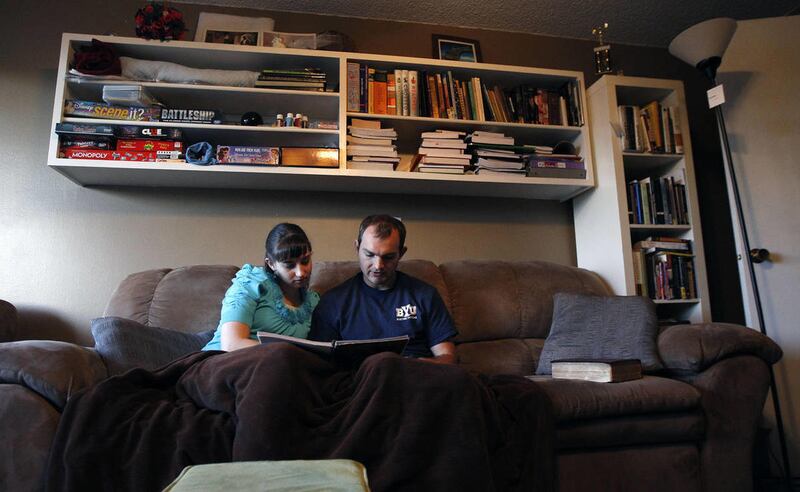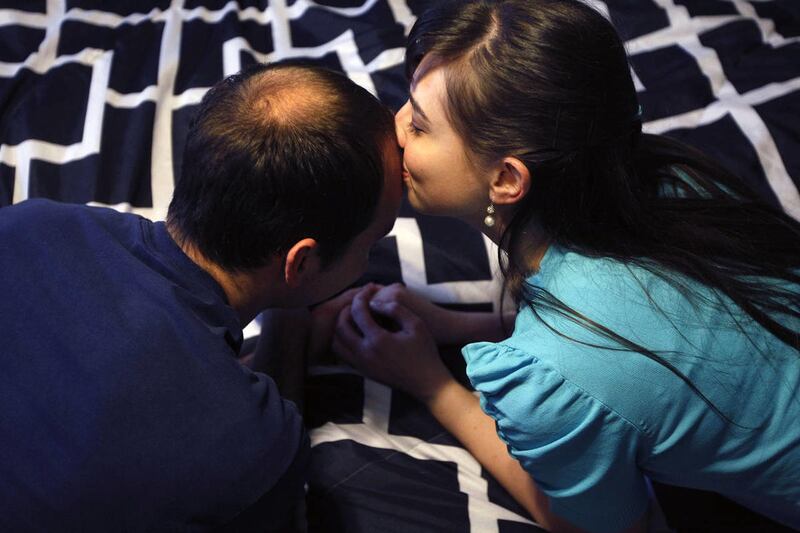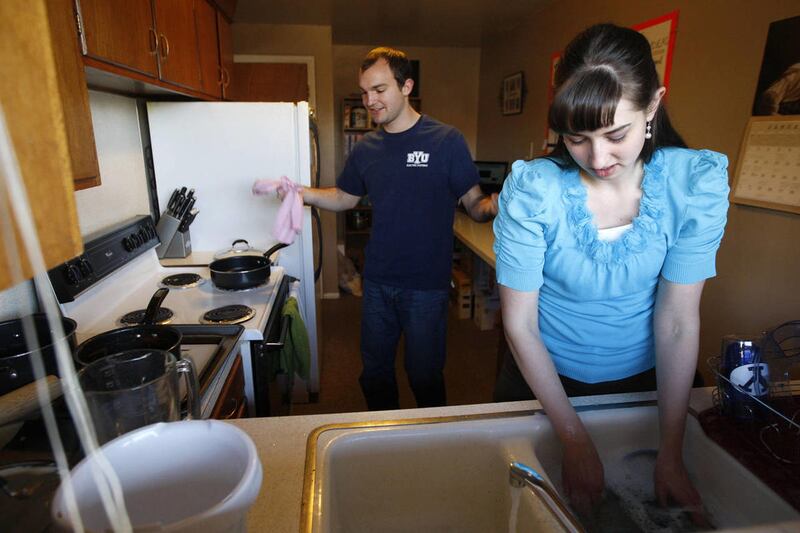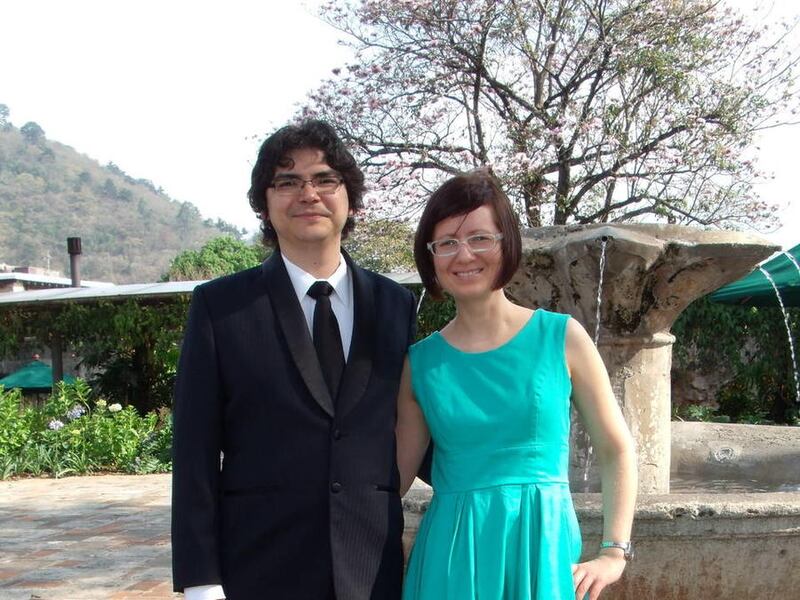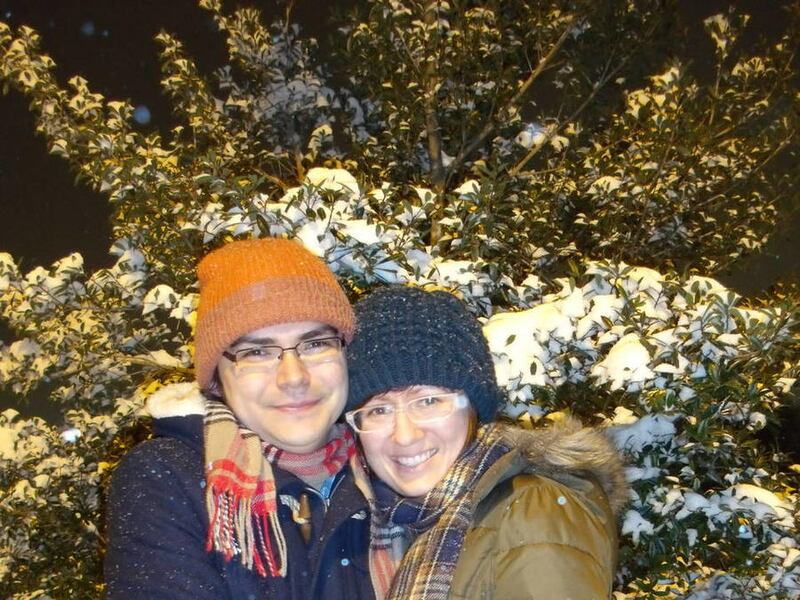PROVO — When Stephen and Jessica Zimmerman come home, they settle into an easy routine. They talk about their day, eat dinner and start to clean up.
But as they begin doing the dishes, the topic usually changes to faith, religion and spirituality.
"We always make a point to talk to each other and share what we can about what we're learning and how we're growing," Jessica Zimmerman, 24, said.
It's what first drew the couple together.
They began having spiritual discussions while they were both single and served together in a singles ward of The Church of Jesus Christ of Latter-day Saints.
Since they were married on Dec. 21, 2014, Jessica Zimmerman said, they have tried to continue their spiritual learning together.
"Being single, I loved talking about my faith," Stephen Zimmerman, 25, said. Once he was married, he felt he then had someone who supported him and could talk with him about faith.
Lem Bach, 34, said when he and his wife, Desirae, 33, were married in 2004, it was easy to skip church services. They were working hard and felt God would want them to be well rested.
"And we were reading something in the Apostle Paul where he was saying that you need to keep meeting together with other people because you all strengthen each other in your faith," he recalled.
So the Bachs started attending the Provo Seventh-day Adventist Church consistently.
"And I can't imagine ever stopping that," he said.
Since then, their involvement has deepened with church activities and spiritual study.
"Like it says in the Bible, being one flesh," Bach said. "We both believe in God and we both believe in getting closer to him and we believe in doing those things together because we're married and we want to be more and more a good unified couple, a unit."
"My own perspective of a rabbi after 32 years is that I am a great believer generally in the idea that a home should have some commitment to some religious faith," said Rabbi Jim Simon of the Temple Har Shalom in Park City.
"One of the great things that religion provides is some type of guidance, some type of moral compass, some type of direction for the family."
Challenges
Rabbi Simon said as he counsels couples before marriages, he reminds them of the inevitable challenges ahead.
"I stress to them, as a rabbi, that to me shared religious beliefs can be very, very helpful in terms of giving couples sort of an extra area of strength or protection that will be helpful to them in difficult times," he said.
That doesn't mean people of faith won't have problems.
"But I am a great believer that if there is some shared sense of religion, this is going to be very helpful in the short term and the long term for each of them individually for the two of them as a couple, and should they later on be blessed with children, it's going to be very helpful for the entire family."
Matthew Draper, a psychologist and associate professor at Utah Valley University, said he has seen very successful marriages and happiness within families who are not informed by religious faith at all.
But he said the research shows that Christian groups reported high satisfaction in their marriages, and it was highest among those of the LDS faith.
"We find that Latter-day Saints tend to report better marital satisfaction when they're both on the same page, even compared to members of other Christian groups," he said.
Togetherness
Faith is not one person's alone but rather it is usually shared, Draper said.
"It's not my faith versus our faith," he said. "Instead, faith is something that, for those who find faith important, needs to meaningfully grow within their relationships."
Ideally, Draper said, couples should support each other in their faith development, whatever that may be.
"If one is on a faith journey and the other one isn't, then there will be some tension, some sadness, even potentially some contention there," he said.
When couples are on a similar path, even if they are on different places along the path of faith development, things go smoother in that part of their marriage, Draper said.
"But again, not to dichotomize my faith versus your faith, it's best if it's our faith," he said. "Even if I am struggling with faith, it's still going to inform the marriage."
Veola Burchett is the director of the Family and Pro-life Office of the Catholic Diocese of Salt Lake City. She oversees programs for engaged couples as they prepare for their weddings.
"The marriage prep programs are designed to help the couples through this time of transition and to strengthen the bond they already share," she said.
The four- to six-month course, guided by a priest or deacon, gives couples helpful tips on marriage, financial fidelity, children, relationships with in-laws and human sexuality, among other topics.
"I always tell couples this: As they are dancing the first dance as a married couple on their wedding day, all eyes will be on them. They will feel very deeply in love," Burchett said. "The church's goal is that at their 50th wedding anniversary, as they take a spin around the dance floor, hopefully surrounded by their children, grandchildren, and friends, that they will be more deeply in love at that dance than they were at the first dance."
Traditions
"Sometimes we assume that if people come from the same faith or religious organization that they're going to be on the same page, but that's not necessarily the case," said Brian Willoughby, associate professor in the School of Family Life at Brigham Young University.
"They might be in the same church or the same faith, but they might have very different ideas about what that means for them on a day-to-day basis, as a couple, as a family, as future parents."
Rabbi Simon said that whether they're an interfaith couple or not, they need to discuss what faith actually means to them. He said it's like managing and building a financial future.
"And that means conversations and discussions and agreement on things," he said. "They also want to be talking about how they want to build their religious future together."
Rabbi Simon said it's not enough to think, "It'll happen on its own."
"Very few good things happen on their own," he said. "They are the result of hard work and planning and deliberation and thoughtfulness."
Willoughby said couples, especially newlyweds, often argue about mundane day-to-day tasks.
"And then the value development and the religious faith stuff kind of happens in the background. As we make those kinds of decisions, they kind of implicitly also suggest to us what we value together," he said.
This is when Willoughby advises couples to sit down and have these discussions.
"The danger of not doing that is couples will end up having the same fights over and over again, and they'll try to fix the specific issue when really it's an underlying belief and value difference that they're having. "
Advice
Willoughby's advice for couples is to not assume that everything will be perfect for the couple because they belong to the same religion.
"There's a lot of variation in how people actually think about their faith and how they utilize their faith on a day-to-day basis," he said. "So it's a very important thing for couples to talk about and not just assume."
"They want to begin now to talk about how they're going to build a religious future," Rabbi Simon said. "That doesn't mean they have to resolve everything in one day. It could be an ongoing conversation; that's good too. But it has to begin."
Bach said in the last four or five years, he and his wife have also begun nightly Bible study lessons and morning devotionals together.
"I know it gives us more of a common ground in our spiritual life," he said. "Other parts of life become a little bit more connected to the spiritual instead of everything being mundane or non-spiritual," he said.
Stephen Zimmerman said one of the things he and his wife do together is set goals.
"For me this has been one of my favorite things. I have my goals, she has her goals and we both set our goals together," he said. "As we've really tried to support each other in setting these goals and accomplishing them, I think that it has actually really helped us grow in our faith."
"Talking to another person or another individual who has a different faith … you still have to respect them as an individual and a person," Jessica Zimmerman said. "And when you talk to someone with that level of respect, it's only love that shows."
Her advice is to start with what you know.
"Go to where you find truth, where you find peace and comfort, and then grow from there," she said. "You always have to start somewhere. Start with what you know and what you care about because those are the things that are going to impact your life."
Email: ebench@deseretnews.com


